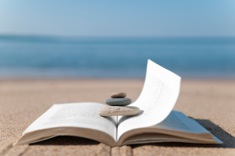It must be remembered that the purpose of education is not to fill the minds of students with facts… it is to teach them to think, if that is possible, and always to think for themselves.
Robert Hutchins
People who aren’t teachers may envy us because we have our summers “off.” Those of us inside the profession chuckle at the notion we are ever really untethered from our job. How we would love a few months, or at times, just a few minutes off from our continual reflection, revision, and reimagining of our classrooms. The truth is that our minds are always working on perfecting the art and science of teaching. Whenever I feel challenged or unsure outside the classroom, I try to find lessons in the experience that will make me a better teacher — even when I am on a holiday. This summer I went on vacation with my husband, and came back renewed, with new understandings of myself and a different attitude toward my students and my responsibilities. I wonder what lessons you are carrying away from your time “off” this summer?
How Do We Know When We’ve Reached Our Limit?
I do not consider myself wimpy by any means. I’ve given birth to two wonderful children, ran a couple half and full marathons, rock-climbed, white-water rafted, and paddled a three-day kayaking trip. I’ve learned how to push myself to the limit, trying to stretch myself physically and mentally. Nothing was off limits.
Recently, my husband and I celebrated our anniversary by traveling to Southwest Colorado, just the two of us. Our first adventure was to drive around a National Park. He likes going to unpopulated places so we drove around the back way. No big deal, right? It did not look that far on the map. (On a side note, I tend to get carsick in the passenger side when driving on less traveled roads for extended periods of time.)
We stopped for a small walk, took pictures, and looked at the falls. Next, we drove around the park, up and down, round and round the mountains. Normally, I can read in the car, but I quickly put a stop to that on this drive. We continued driving and I tried another strategy: taking deep breaths. Another hour passed. Up and down, round and round. Some ledges had no railing and we continued going higher. I stopped looking and focused ahead. Still not working. I was getting very sick and claustrophobic.
I was asking how long until we were on a highway. He could not tell from the map. Another hour went by.
My last and final strategy was to close my eyes. In my mind, I kept thinking the worst. Claustrophobia was at its peak. Tears started forming. My throat was closing in. I couldn’t breathe. After I had exhausted all my strategies, I yelled, “Stop the car!” He pulled over. I jumped out, began hyperventilating, putting my head between my knees, and rode out my panic attack on the side of the mountain.
After I rested outside and drank some water, I was able to finish the ride (another hour), laughing about how this attack was similar to one I experienced on our kayaking trip. It was that moment that I recognized the metaphor for teachers.
How many times have we as teachers taken on more committees than we are able to manage? We’ve put too much on our plate and used all our strategies to try to accomplish it all. It’s the end of a quarter. We’ve got grade cards, assessments to grade, databases to complete, and there are more on our plates at home. Yet there comes the time, when we panic. Our walls begin closing in and we need to yell, “STOP!”
Or when working with promising students, we exhaust all the tools in our toolboxes. We work in small groups and one-on-one with them. We try all the strategies to help them succeed. But there comes a time when a break is needed. They are exhausted and so are we. Come back to it another day.
As teachers, we are masters at multitasking. There are times throughout the year when we burn the candle at both ends. It’s those times when we need a rest. We need to yell “Stop.” It’s time to renew ourselves and re-energize. For me, that is the summer break. Time to slow down and renew myself mentally and physically. Know yourself and your coping mechanisms. Know what your breaking point is and stop before the panic sets in. Know when to press on and when to stop. That’s my goal for next year. Think about what I am taking on before saying “yes.” Maybe do a few things well instead of many things in a mediocre way. For me, it’s definitely a continuum, but each year I move a little bit further down the line.
By the way, in all the times my husband has traveled to Colorado, he has never seen a bear. During that drive, a bear walked in front of our car. He wanted so badly to take a picture, but was more scared of me than the bear at that moment!
Choices for Teachers, Learners, and Vacationers
As our Colorado trip continued, I enjoyed days when we hiked, soaked in the hot springs, and checked out the local shops and independent bookstores. I continued to battle altitude sickness. Periods of dizziness followed by pounding headaches does not make for a relaxing vacation. Yet, I knew my husband was dying to drive on the dirt roads in the mountains. How do we both follow our interests without hindering the other one?
We decided to pursue separate interests twice throughout the week. He rented a jeep to go 4-wheeling in the mountains for a couple hours, and I spent the morning at a spa, purchasing a couple books at the town bookstore, and reading on one of the trails. We both like to travel, but have learned from earlier in the week, I cannot do mountain trail driving.
This got me thinking about district pacing guides and standardized curriculum. We’ve lost what makes each teacher unique. I have personally struggled with the notion that every grade level teacher should be teaching the same thing, at the same time, and the same way. I understand that parents talk about what each teacher is doing and questioning why they are not teaching like the person next door. But, parents always talk. Some of it is good and some not so good, but they will always talk.
We work hard to find ways to tap into each child’s unique learning style and passion. We read books and search for strategies to enable every student to be successful, yet recognize that every student is different. We give them book choices, writing choices, and math choices. It’s in these choices that students thrive. They learn, and become passionate about their learning.
I am a fourth-grade teacher. I studied the state standards and know what fourth graders need to accomplish. Many of the social studies and science standards are able to be interwoven all year long, instead of being taught in isolation. This is how real world learning takes place.
Shouldn’t teachers be given choice of how to teach the standards? We are unique. We all have individual skills and passions that separate us from the teacher next door. If I tap students’ interests that take them off the pacing guide, is it not my mission to lead them on the journey? Should I guide them to research their questions and passions? I recognize the idea behind state standards and objectives. However, I also trust teachers to do what is right for their students. Sometimes students in classrooms need to move on different paths, to different places in their learning . . . just like my husband and me on our vacation.






